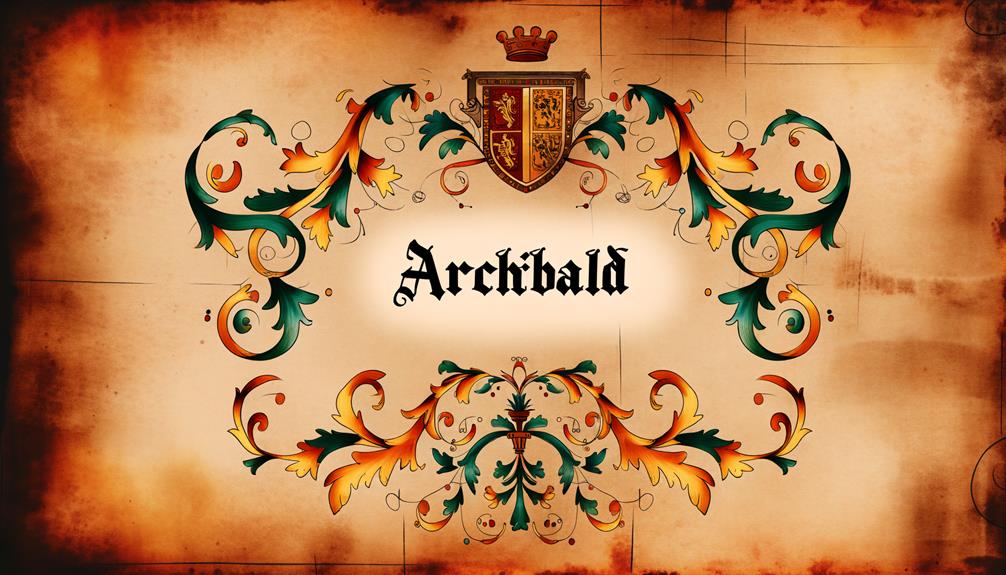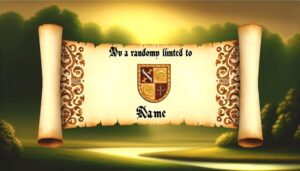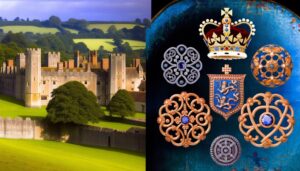Archibald Name Meaning and Origin
The name Archibald derives from Old High German, combining 'ercan' meaning genuine and 'bald' signifying brave. Introduced to Britain by the Normans after 1066, it reflects early Germanic values emphasizing authenticity and courage.
The name gained prominence in Scotland in the 11th century, carrying connotations of nobility, strength, and leadership. Its historical resonance is evident in politics, literature, and academia, with notable bearers like the 5th Earl of Rosebery and poet Archibald MacLeish.
The name remains popular today, appreciated for its vintage charm and strong phonetic structure. Understanding its etymology offers deeper insight into its enduring appeal.

Key Takeaways
- Archibald derives from Old High German elements 'ercan' (genuine) and 'bald' (brave).
- The name was introduced to Britain by the Normans after 1066.
- Archibald carries meanings of nobility, strength, and bravery.
- It has historical ties to leadership, politics, literature, and arts.
- Common diminutive forms include 'Archie' and 'Baldie'.
Origin of Archibald
The name Archibald, of Old High German origin, is derived from the elements 'ercan,' meaning genuine, and 'bald,' meaning bold or brave. This etymological construction reflects the cultural values and linguistic practices of early Germanic tribes.
The name was introduced to Britain by the Normans after the conquest of 1066, becoming particularly prevalent in Scotland. Its adoption in various forms across European regions underscores its adaptability and the transference of cultural ideals through language.
The historical journey of the name Archibald illustrates the interplay between migration, cultural integration, and linguistic evolution. As societies evolved, the name retained its original connotations, encapsulating the enduring qualities of authenticity and bravery within its syllabic structure.
Meaning of the Name
The name Archibald carries a profound etymological significance that has influenced its historical perception. Notable bearers of the name, such as Archibald Campbell, the 9th Earl of Argyll, have contributed to its distinguished legacy.
In contemporary culture, the name retains a sense of nobility and strength, reflecting its enduring appeal and significance.
Etymology and Historical Roots
Tracing its origins to the Old High German name 'Ercanbald,' the name Archibald combines 'ercan,' meaning genuine or precious, with 'bald,' meaning bold or brave, reflecting a rich historical tapestry.
This etymological construction underscores a significant cultural valuation of attributes such as authenticity and courage. The name further evolved as it traversed through the Anglo-Saxon and Norman cultures, ultimately being introduced to Scotland around the 11th century.
Medieval records indicate its frequent use among the Scottish nobility, solidifying its status as a name denoting leadership and valor. Consequently, Archibald's linguistic and historical journey exemplifies the enduring human admiration for qualities of integrity and bravery, encapsulated within a single, time-honored name.
Notable Name Bearers
Numerous distinguished individuals throughout history have borne the name Archibald, each contributing to its legacy of leadership and valor.
One prominent figure is Archibald Campbell, the 9th Earl of Argyll, known for his pivotal role in the Scottish Covenanter movement during the 17th century.
Another notable bearer is Archibald Primrose, the 5th Earl of Rosebery, who served as the British Prime Minister from 1894 to 1895.
Additionally, Archibald MacLeish, an influential American poet and Librarian of Congress, garnered acclaim for his literary and public service contributions.
These individuals exemplify the name's historical association with governance, intellectual prowess, and cultural impact, reinforcing the name Archibald's enduring resonance in various spheres of influence.
Cultural Significance Today
In contemporary contexts, the name Archibald continues to resonate culturally, symbolizing a legacy of leadership, intellectual rigor, and artistic achievement. This storied name has maintained its relevance through various channels:
- Historical Influence: Archibald has been borne by influential figures in politics, literature, and the arts.
- Cultural Representation: The name appears in modern media, reinforcing its dignified and scholarly aura.
- Academic Associations: Often linked to intellectual pursuits, it evokes a sense of erudition and scholarly achievement.
- Leadership Connotations: The name is frequently associated with strong, decisive leadership.
- Enduring Popularity: Despite fluctuations in naming trends, Archibald persists as a choice that conveys tradition and honor.
Its enduring significance underscores a blend of historic grandeur and contemporary relevance.
Historical Roots
Originating from the Old High German name 'Ercanbald,' the name Archibald has deep historical roots that span several centuries and cultures. The name is a compound of 'ercan,' meaning genuine or precious, and 'bald,' meaning bold or brave. This etymology reflects a valorous and esteemed character, qualities highly valued in early European societies.
The name evolved through various linguistic phases, including Old French and Middle English, before solidifying in its contemporary form. It was notably popular among the Scots, where it became emblematic of leadership and nobility. Understanding Archibald’s historical evolution provides insight into the cultural and linguistic shifts that have shaped the name into its present-day usage. The maurice name meaning has also undergone changes over time, reflecting the evolving perceptions and values associated with the name. In contemporary society, the name Archibald may carry different connotations than it did in its earlier iterations. Understanding these shifts in meaning can provide a deeper understanding of the cultural significance of the name within different historical contexts.
Medieval Usage
During the medieval period, the name Archibald was mainly associated with nobility and chivalric ideals, reflecting the societal emphasis on valor and leadership. This association with high-status individuals and knights made it a prominent choice among the aristocracy.
The name itself, derived from the Germanic elements 'ercan' (genuine) and 'bald' (bold), underscored qualities admired in medieval society.
Key points regarding its usage include:
- Noble Lineage: Frequently borne by members of the noble class.
- Military Leadership: Often linked to leaders in battles and crusades.
- Feudal Influence: Common among landholders and influential feudal lords.
- Symbol of Virtue: Embodied ideals of bravery and honor.
- Heraldic Representation: Featured prominently in family crests and coats of arms.
This historical context underscores the name's significance in medieval times.
Archibald in Literature
The name Archibald has been featured prominently in both classic and modern literature, reflecting its enduring appeal and versatility.
Classic literary references often depict characters named Archibald as noble or scholarly, aligning with the name's historical gravitas.
In contrast, modern literary appearances sometimes reimagine Archibald in more diverse contexts, showcasing the name's adaptability to various character archetypes and narrative settings.
Classic Literary References
Throughout classic literature, the name Archibald frequently appears as a symbol of nobility, strength, and complexity in various character portrayals. This name often imbues characters with a sense of gravitas and depth, reflecting societal values and the intricate human condition. Notable literary works have employed the name Archibald to delineate multifaceted personas, offering rich, nuanced narratives.
Consider the following attributes associated with characters named Archibald:
- Nobility: Characters often embody aristocratic qualities and high moral standards.
- Strength: Archibalds are typically depicted as resilient and formidable.
- Complexity: These characters often possess intricate, layered personalities.
- Leadership: Frequently seen in roles of authority or influence.
- Tradition: Reflects deep-rooted historical and cultural significance.
This consistent portrayal underscores the enduring literary resonance of the name Archibald.
Modern Literary Appearances
In contemporary literature, the name Archibald continues to evoke a sense of tradition and depth, often utilized by authors to craft characters that embody both modern complexities and timeless virtues. This name frequently appears in narratives where a character's heritage or moral fiber plays a pivotal role.
For instance, in the works of contemporary writers such as Alexander McCall Smith, characters named Archibald often possess an inherent wisdom and gravitas, bridging old-world values with present-day dilemmas. The name's robust historical resonance allows authors to explore themes of identity, legacy, and ethical fortitude.
Hence, Archibald serves not merely as a character name but as a literary tool that enriches the narrative texture and highlights the enduring relevance of traditional virtues in modern contexts.
Modern Popularity
Amid shifting naming trends, the name Archibald has experienced a nuanced resurgence in certain demographics. This revival can be attributed to various interconnected factors:
- Vintage Appeal: The name carries a classic charm that appeals to those favoring traditional, historical names.
- Celebrity Influence: Notable figures naming their children Archibald have contributed to its renewed popularity.
- Literary Heritage: References in contemporary literature and media have rekindled interest in the name.
- Unique Sound: Its distinct phonetic structure sets it apart from more common names, attracting parents seeking uniqueness.
- Cultural Shifts: A broader trend towards old-fashioned names has emerged in recent years.
These elements collectively foster an environment where Archibald finds a place among modern name choices.
Cultural Significance
The name Archibald holds substantial cultural significance, rooted in its historical associations and enduring presence in various societal contexts.
Originating from the Old High German elements 'ercan' (genuine) and 'bald' (bold), the name embodies a blend of authenticity and bravery.
In medieval Scotland, Archibald was esteemed among the nobility, symbolizing leadership and valor. Its use among Scottish clans underlines its importance in heraldry and lineage.
In literature and the arts, Archibald often appears as a character name, reflecting a blend of tradition and strength. Additionally, its adoption in various forms across Europe and North America highlights its adaptability and timeless appeal.
Therefore, Archibald's cultural resonance is both historically rich and contemporarily relevant.
Famous Archibalds
Prominent figures named Archibald have further cemented the name's legacy, showcasing its enduring impact through notable contributions in various fields such as politics, sports, and the arts. These individuals have not only brought honor to the name but have also influenced their respective domains notably.
- Archibald Cox: Renowned for his role as a special prosecutor during the Watergate scandal.
- Archibald MacLeish: A celebrated poet and Librarian of Congress.
- Archie Griffin: The only two-time Heisman Trophy winner in American football history.
- Archibald Primrose: The 5th Earl of Rosebery, who served as British Prime Minister.
- Archibald Motley: An influential African-American painter known for his depictions of urban life.
Each of these individuals exemplifies the diverse impact of the name Archibald.
Variations and Nicknames
Fascinatingly, the name Archibald has evolved into various forms and affectionate nicknames over time, reflecting its adaptability and enduring charm across different cultures and periods.
The most common diminutive is 'Archie,' a nickname that has gained popularity for its approachable and friendly nature. In some contexts, “Baldie” has also emerged as an endearing variant.
Additionally, the name has been adapted into other languages; for instance, the French version 'Archambault' and the Spanish 'Archibaldo' offer unique cultural twists.
These variations and nicknames not only showcase the name's versatility but also underscore how it has been embraced and personalized within diverse linguistic and cultural frameworks, ensuring its continued relevance and resonance through the ages.
Conclusion
The name Archibald, with its rich tapestry of historical roots, literary associations, and cultural significance, stands as a monument to enduring tradition.
Like a well-woven tapestry, it intertwines elements of strength and nobility, reflecting its meaning and origin.
The name's evolution from medieval times to modern popularity underscores its adaptability and lasting appeal.
Famous bearers of the name further cement its legacy, ensuring that Archibald remains a distinguished and multifaceted name through the ages.






